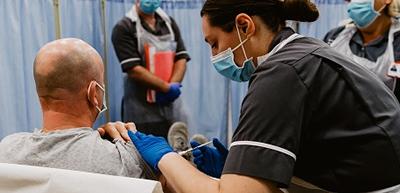University Professor to open a new front on coronavirus with latest vaccine trial

Professor Saul Faust from the Faculty of Medicine is calling on the city and region’s adults to join trials of a vaccine using tried and tested technology to tackle the virus from yet another angle.
These early phase 1 and 2 studies are testing how well the UK-developed vaccine triggers the body’s immune defences against coronavirus, and its safety in 150 healthy adults aged 18-55. Southampton doctors are asking the city and region to help out and sign up via the link at www.UKCovid19study.com
“It’s vital we continue to test new vaccines as they become available. As the new variants have shown, coronavirus keeps moving the goalposts and it’s unlikely that there will be a single solution that protects everyone and gets us out of this.” Comments Prof Faust.
“Different vaccines work in different ways and we need the public’s help to understand how well each one protects us and prevents transmission, particularly which ones are most appropriate for different groups of people. Searching ‘covid19 study registry” and signing up is a positive step anyone can take to help the NHS tackle the virus and get us all out of the pandemic.” he adds.
Made by biotech company Valneva, this latest vaccine uses a proven technology already used in existing vaccines used for prevention of diseases such as flu, Japanese encephalitis, tick borne encephalitis, polio, and rabies. In doing so, it takes a completely different approach to the recently licensed Oxford-AstraZeneca, Pfizer and Moderna vaccines, potentially providing additional resilience against new variants.
If successful, these early trials will pave the way for larger trials involving more than 4,000 volunteers UK-wide, testing two doses of the vaccine in in thise aged 18-65 and the over 65s.
Early access to 60 million doses of this vaccine, subject to successful trials, has been secured by the UK Government, with up to 250 million vaccine doses to be supplied worldwide.
This is the fifth NIHR-supported vaccine to enter clinical trials in the UK, alongside Oxford/AstraZeneca, Imperial College London, Novavax and Janssen, whose studies are currently ongoing.
Some of the volunteers taking part in these latest clinical trials came through from the NHS COVID-19 Vaccine Research Registry, which enables the UK public to support the national effort to speed up vaccine research. Over 365,000 people have already signed up to the Registry, giving their permission to be contacted about taking part in vaccine research and more volunteers are still needed.
The Registry was launched by the UK government in partnership with the NIHR, NHS Digital, the Scottish and Welsh governments and the Northern Ireland Executive earlier this year.
Further information on the trial
Valenva’s vaccine candidate, VLA2001, is a highly purified, inactivated vaccine candidate against the SARS-CoV-2 virus that uses manufacturing technology from Valneva’s Japanese Encephalitis Vaccine. The inactivation process preserves the structure of the virus’ S protein and is expected to induce a strong immune response. This is a proven technology already used in existing vaccines used for prevention of diseases such as flu, Japanese encephalitis, tick borne encephalitis, polio, and rabies.
The first clinical study will be a (open-label) dose-escalation, randomized (double-blinded), multicenter study with three study arms enrolling 50 subjects each. Vaccinations will be administered at Days 1 and 22 with follow-up visits up to 6 months after the second dose. This study is planned to enrol subjects tested negative for previous SARS-CoV-2 infection.
The second clinical study will be initiated upon availability of safety and peak titer immunogenicity data from the first clinical study.
Planned for April 2021, the second clinical study will be a randomized, controlled, observer-blinded study in subjects aged 18 years or older. Approximately 4225 subjects will be randomized to either receive VLA2001 or control. Subjects aged 18-65 years will receive VLA2001 at the dose selected based on study VLA2001, for subjects aged above 65 years a higher VLA2001 dose level will be evaluated as well. Vaccinations will be administered at Days 1 and 22, follow-up visits will be conducted for one year to assess safety in all subjects and to collect immunogenicity in a sub-set of study participants. This study will enrol subjects regardless of their SARS-CoV-2 serostatus.